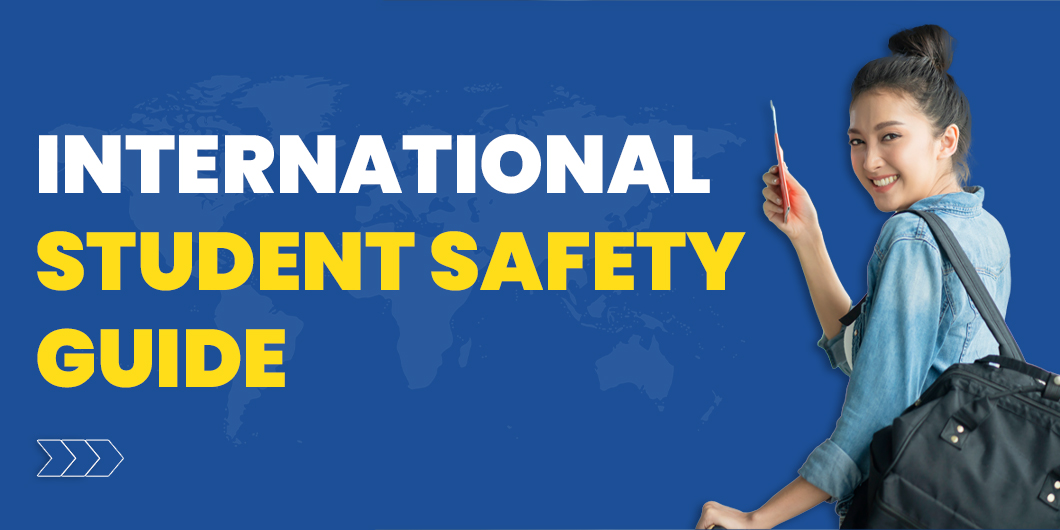Studying abroad is an incredible adventure, but venturing into unfamiliar territory can raise safety concerns. Here is a comprehensive guide to stay safe throughout your international student experience:
Be Aware of Your Surroundings:
- Research: Before arrival, research your university's location and surrounding areas. Are there high-crime zones? What are the well-lit and safe routes for walking at night?
- Campus Map: Familiarize yourself with the university campus layout, noting security offices, emergency call points, and well-lit pathways.
- Trust Your Gut: If a situation feels unsafe, it probably is. Avoid deserted areas, especially at night.
Information is Power:
- Emergency Numbers: Memorize emergency contact numbers for the police, ambulance, and fire department. Program them into your phone for quick access.
- University Resources: Many universities offer safety workshops, self-defence classes, and after-dark escort services. Utilize these resources and learn about emergency protocols on campus.
- Embassy/Consulate: Register with your home embassy or consulate upon arrival. They can assist with lost passports, legal issues, and offer valuable safety updates.
Travel Safety:
- Public Transportation: Understand how public transport works and stick to well-lit, populated routes, especially at night.
- Taxis: Use reputable taxi services or ride-sharing apps with real-time tracking. Avoid unmarked taxis, especially late at night.
- Luggage: Keep your luggage close at hand in crowded areas, and avoid carrying excessive valuables while traveling.
Scam Alert:
- Beware of Unwanted Offers: Be cautious of unsolicited emails, calls, or people offering "easy money" schemes. These are often scams targeting international students.
- Fake Accommodation: Research rentals thoroughly before making any payments. Never send money without a verified contract.
- ATM Safety: Use ATMs in well-lit, public areas. Be discreet while entering your PIN and avoid using ATMs with suspicious attachments.
Stay Connected:
- Inform Family and Friends: Keep loved ones informed about your travel plans, school address, and emergency contact details.
- Download Communication Apps: Use popular messaging apps to stay connected with family and friends back home.
- Local SIM Card: Consider getting a local SIM card for affordable communication within the country.
Embrace Cultural Sensitivity:
- Research Local Customs: Spend time learning about local customs, etiquette, and dress codes. Respecting the local culture will help you blend in and avoid unwanted attention.
- Language Basics: Learn some basic phrases in the local language. This will help you navigate everyday situations and demonstrate respect for the culture.
- Be Open-minded: Embrace the opportunity to learn from a new culture. Be open to trying new things and understanding different perspectives.
Alcohol and Drugs:
- Know Your Limits: Set safe limits for alcohol consumption. Excessive drinking can impair your judgment and put you in vulnerable situations.
- Drugs are Illegal: Drug use is illegal in most countries. Avoid any involvement with drugs to stay safe and avoid legal trouble.
- Look Out for Friends: Keep an eye on your friends if they've been drinking. Ensure they get home safely and avoid leaving them alone in vulnerable situations.
Pubs and Dark Places:
- Go With a Group: When going to pubs or clubs, stick with a group of friends. Avoid going alone or leaving the group in unfamiliar surroundings.
- Be Alert: Stay aware of your surroundings and avoid leaving drinks unattended.
- Plan Your Way Home: Decide on a safe way to get back home before heading out. Consider pre-booking a taxi or using a ride-sharing app.
Cultivate Self-Reliance:
- Learn Basic Self-Defense: Consider taking a self-defense class to boost your confidence and learn basic techniques in case of an emergency.
- Carry Essentials: Always carry a phone charger, a map (digital or physical), and a small amount of local currency when venturing out.
- Invest in a Portable Charger: A portable charger ensures you can stay connected and access help in case of emergencies.
Prioritize Health and Well-being:
- Get Health Insurance: Ensure you have adequate health insurance coverage for your study abroad program. Familiarize yourself with the local healthcare system.
- Mental Health Matters: Studying abroad can be stressful. Don't be afraid to seek support from university counseling services or mental health professionals if needed.
- Maintain a Healthy Lifestyle: Eat nutritious meals, get enough sleep, and stay active. A healthy lifestyle will boost your energy levels and overall wellbeing.
Remember, safety is a shared responsibility. By staying informed, prepared, and vigilant, you can have a safe and enjoyable experience studying abroad.
Ready to Begin Your Study Abroad Journey?
If you're ready to embark on your study abroad adventure, reach out to IVY Overseas to start your journey. With our expertise and personalized support, we'll help you navigate the application process, choose the right program, and ensure a smooth transition to your new academic environment.
Contact IVY Overseas Telangana 91054 91054 / Andhra Pradesh 76609 76609today to explore your study abroad options and embark on an unforgettable educational experience!


